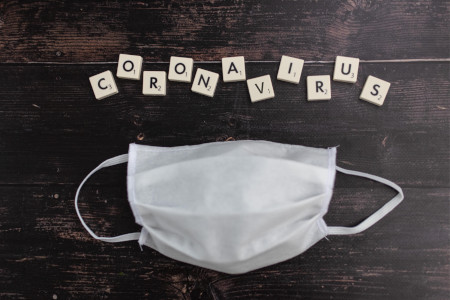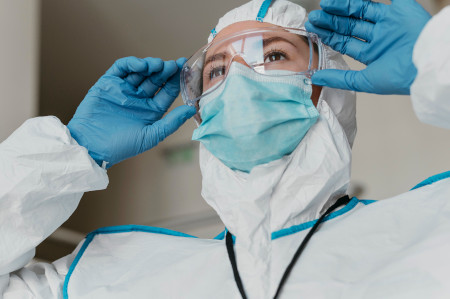Demystifying COVID words and abbreviations
Common vocabulary used during the pandemic
Choose the right words to talk about your COVID experience!
The COVID outbreak of 2020 taught everyone a lot. It taught it us how to work from home, how to protect our health in public, and, most importantly, how to be resilient in the face of constant uncertainty. It also gave everyone the opportunity to learn some useful vocabulary.
Through the initial international panic, the recurring lockdowns, and instances of quarantining, every news story about the pandemic carried with it a whole new set of vocabulary. At that time, most native speakers were either unfamiliar with some of these words. Within two years, words that were used in scientific English in the past began to enter everyday English. As a result of the global pandemic, everyone’s vocabulary increased a little bit.

From Pre- to Post-
The sequence of paragraphs below takes us from February 2020 (pre-COVID) to December 2022 (post-COVID). Each paragraph about the COVID-19 situation contains five common vocabulary words and two common acronyms. Each word has been defined with the COVID situation in mind, though other definitions for many of the words may be possible.
February 2020
It was announced early this morning that the recent epidemic located in and around Wuhan, China is a form of the novel-coronavirus. WHO has named it COVID-19. The organization has confirmed that the virus is highly contagious between people and is transmitted by air droplets. Though highly contagious, 40% of people who have the virus are asymptomatic, so they may know that they carry and virus
- asymptomatic (adj.) — showing no signs (symptoms) of illness or disease
- contagious (adj.) — can carry a virus and give it to others
- COVID-19 (n.) — COrona-VIrus Disease of 2019
- droplet (n.) — a small drop, usually carried by air
- epidemic (n.) — a virus that spreads quickly in a local area or population
- transmit (v.) — when a virus moves between people
- WHO (n.) - the World Health Organization
March 2020
After 100,000 cases have spread to 60 countries around the world, WHO has upgraded the COVID-19 local epidemic to a global pandemic. In America, the CDC followed WHO’s recommendation and announced new measures to prevent the spread of the virus. It is advised for all residents to stay at home. If anyone shows flu-like symptoms (cough, fever), visit the near testing facility where healthcare professionals wearing PPE will confirm the diagnosis.
- case (n.) — a person who has the virus
- CDC (n.) — the Center for Disease Control (the United States government)
- diagnose (v.) — to identify the cause of an illness
- measure (n.) — an action taken for a specific result
- pandemic (n.) — a virus that spreads quickly through a wide area or population
- PPE (n.) — personal protective equipment, such as masks and gloves
- symptom (n.) — a sign of an illness
May 2021
Following the super-spreader event in Ekkamai in early April, the Songkran holidays encouraged people to travel. This caused viral outbreaks in numerous provinces, such as Khon Kaen and Surat Thani. The medical community has encouraged the government to proactively announce a curfew in the Bangkok area. Economists agree that this is better than a lockdown, which is more common in China. Residents are still encouraged to WFH and wear N95 masks.
- curfew (n.) — an emergency situation when people are not allowed outside
- lockdown (n.) — an emergency situation when people are ordered to stay at home
- N95 (adj.) — a mask that is not resistant to oil and filters 95% of air particles
- outbreak (n.) — a sudden increase in the cases of a virus
- proactive (adj.) — actions taken for a problem before it happens
- super-spreader (n.) — a person who has a highly contagious form of a virus
- WFH (n.) — work from home

August 2021
The government has encouraged everyone—including foreigners—to receive at least two doses of the recent AstraZeneca vaccine. At the moment, mRNA vaccines (such as Moderna and Pfizer) have no license or distribution in Thailand. The side effects for the vaccines are often to the virus itself, so those with flu-like symptoms don’t need to take a PCR test. However, anyone who does test positive for COVID-19 must either self-isolate or stay in a hospitel.
- dose (n.) — a specific quantity of a vaccine
- hospitel (n.) — a portmanteau of two words: hospital + hotel
- mRNA (n.) — RNA used to carry (as a messenger) to DNA to make specific proteins
- PCR (n.) — polymerase chain reaction, a method of quickly copying DNA for testing
- self-isolate (v.) — to stay by yourself when viral infection is certain
- side effect (n.) — a secondary and undesirable effect of medicine or a vaccine
- vaccine (n.) — the weakened form of a virus given to people to fight the real virus
December 2021
Now that the Omicron variant has been found in Thailand, the government has allowed private business to distribute and sell ATK tests. As per previous recommendations, anyone who has been exposed to COVID-19 is requested to quarantine themselves in case of infection. Moving forward, the Thai FDA hopes to declare COVID-19 as endemic in the middle of next year, a move which will allow people to live their normal lives once again.
- ATK (n.) — antigen test kit, a method of detecting the body’s response to a virus
- endemic (adj.) — common in a location, region, or population
- expose (v.) — to come into contact with some who has a virus
- FDA (n.) — the Food and Drug Administration (the Thai government)
- infect (v.) — to transmit a virus to another person
- quarantine (n.) — to stay by yourself when viral infection is uncertain
- variant (n.) — a differ form (delta or omicron) of the original (alpha)
December 2022
As ER and ICU rooms in city hospitals fill with COVID cases, China has announced they will lift entry restrictions for residents and travellers. One requirement for travellers will be to show a proof of vaccination, expect for those with religious exemptions. Furthermore, everyone will need to download a location-tracking app to apply authorities to track cases of COVID throughout the country. Non-compliance with these measure will swiftly punished.
- ER (n.) — emergency room
- exemption (n.) — not affected by regulations, free from obligation
- ICU (n.) — intensive care unit, a hospital department for serious illnesses
- location-tracking (n.) — a method used to track movement and cases of COVID
- non-compliance (n.) — refusal to follow rules or measures
- requirement (n.) — a demand or need with meet regulations
- restriction (n.) — a limitation or regulation to control something

